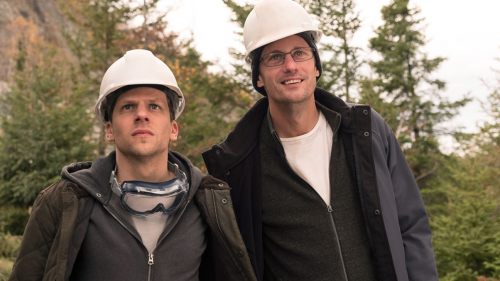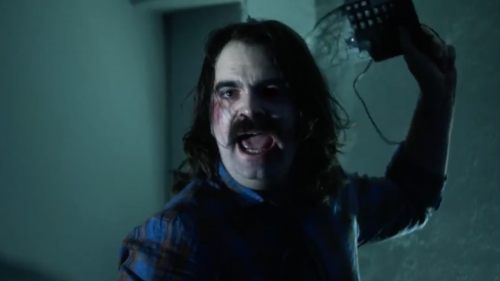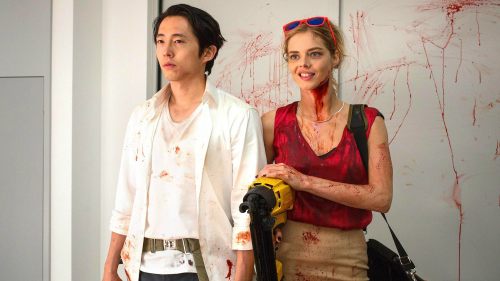The Badass Interview: Joe Lynch on EVERLY
Most likely, Joe Lynch’s name makes you think of horror. The Long Island, New York, native, who first paid his dues working through the infamous New York-based Troma Entertainment machine, initially caught genre viewers’ collective attention with Wrong Turn 2, the gory 2007 sequel that’s infinitely better than anyone expected. He’s also one-half of the TV show Holliston, alongside fellow indie horror hustler Adam Green - Lynch and Green also co-host the popular podcast The Movie Crypt, on which Lynch has talked in-depth about the unanticipated behind-the-scenes horrors of his second feature, the much-troubled horror-comedy Knights of Badassdom.
But with his latest film, Lynch has triumphantly switched genres. A lean and breathless one-location action movie, Everly stars Salma Hayek as a prostitute fighting for her life inside a claustrophobic apartment as the Yakuza, professional sadists and money-hungry hookers all try to collect the pricey bounty on her head. It’s a major leap forward for Lynch, who uses his encyclopedia-like film knowledge to mix progressive action with classic genre influences.
Here, Lynch explains how those many influences informed his impressive action debut, and how, believe it or not, it almost starred Kate Hudson.
***
Modern-day action cinema exists in a kind of post-The Raid climate, where action movies can’t get by on the genre’s basics anymore - filmmakers really need to step their games up. And that’s what I liked about Everly. It’s clearly a film made by someone who’s looking to push action cinema forward.
Believe me, we were definitely influenced by The Raid. We never said, “Okay, let’s take what The Raid did to the next level,” because there’s no way you can take The Raid to the next level. Gareth already did that - it’s called The Raid 2. But, yeah, since that film, there’s been such a premium on the way you present action, especially since post-production technology has made it so easy for you to just add a thousand bullet hits, to where you see more bullet casings than any actual blood. You now have to adjust your visual strategy during the actual production in order to bring your film to another level. With The Raid, obviously Gareth knew all of the limitations and the constraints and also knew how to push them further. We watched The Raid a lot - I showed my DP that movie repeatedly over a bunch of weekends before production to grasp how to subvert the expectations of how you shoot an action film.
That’s the thing that most intrigued me: how can we shoot an action sequence, or even a dramatic sequence, in a way that defies what the audience is expecting? Now everyone expects highly kinetic editing and crazy handheld shots where the camera gets passed hand-to-hand from a moving car to a moving motorcycle. Those kinds of visual histrionics that Gareth and Timo [Tjahjanto] have brought to the genre, from The Raid to Timo’s amazing Killers, show that they know the conventions and are fearless about tweaking them. With Everly, I wanted to delve more into the Hitchcock side of it, or more of the Luc Besson or Michael Mann sides. I also looked to the Coen Brothers, too, in how they present genre setpieces in ways that are just slightly askew. Everly’s action sequences aren’t these extended and flashy sequences, which people might be expecting if they hear that it’s like The Raid or Kill Bill. I was like, “Let’s see how much you can play out in one shot,” but without it becoming Birdman: The Action Movie.
It’s tricky way to approach an action movie. You don’t want to be too grandstanding with your visuals. You don’t want to that guy who’s swinging from the rafters screaming, “Look at my cool shots!” But you do want the audience to walk away from the film saying, “Wow, that happened in a way that I wasn’t expecting,” whether it’s visually or dramatically. If I were a fan who heard someone say, “This movie tries to do action a bit differently,” I’d immediately want to see it, even if I end up hating the movie. I’d at least be able to appreciate that they’re trying something different.
It’s rare for action movies to present new and original moments of violence, but there’s that moment in Everly where Salma Hayek’s character blows one guy away, with a shotgun, into a crowded elevator and tosses a grenade into the elevator, causing a splash of blood as the door shuts. That’s where Everly’s connection to what Gareth Evans has been doing really clicks into focus.
When you’re watching a movie like this, it runs the whole gamut of emotions, from stark realism to stylized violence. But once the doorman gets shot at around minute eight, that’s when the film tells you it’s okay to laugh. We designed it to be a rollercoaster ride, and it’s not for everybody. Not everybody likes tonal changes. I personally don’t mind it—if anything, I like it. For example, From Dusk Till Dawn, which goes from a heist movie to a road movie to a vampire movie, and when that happens, I’m like, “Fuck yeah, man!” Surprise me.
I want the audience to be surprised and to have fun with it. Everly isn’t Traffic - I’m not making a movie about sex trafficking or anything like that; at the same time, I’m not making Shoot ‘Em Up, where the stakes are more on the level of a Looney Tunes cartoon. You never have to worry that the baby in Shoot ‘Em Up is in trouble, especially not in Monica Bellucci’s arms. [Laughs.] And Paul Giamatti is just chewing up scenery for the sake of chewing up scenery. That was that movie’s point, and it did that really well. But we didn’t want to make that kind of movie.
The intention behind Everly was to blend all of that into the story I wanted to tell. You can have all of those crazy antics and crazy visuals, like the blood shooting out of the elevator, like you mentioned, but as long as the audience knows that Salma’s character’s main arc is grounded in a real place, where she’s trying to protect her mother and her daughter, the crazy antics will work that much better. She’s an animal trapped into a corner and she’s trying to claw her way out, but she’s also trying to keep her family alive. Those are all things that, hopefully, audiences can relate to.
When I first wrote the movie, I didn’t have any kids, but now I have two kids! I can relate to her character even more now. As a parent, specifically, it puts you in that situation of, “What would you do?” I took a lot of inspiration from that Jonathan Mostow movie Breakdown, with Kurt Russell - that’s the ultimate movie to put any audience member into the position of the husband or wife and asks, “What would you do in that situation?” And that movie gets really crazy! As long as the emotions come from a real place, you can, in my mind, get away with anything.
Like making your villains the Yakuza and including sadists wearing Kabuki masks.
Exactly! I’ve had this love for Yakuza films and Japanese cinema since I was, like, 10 years old. That’s when I first Rashomon, and it just built from there. I then started watching movies from directors like Takashi Miike. The styles that those guys had and the extremes that they went to were so exciting to me - I never knew what to expect next. Those films were definitely the archetypes for a lot of the tonal changes and the insanity in Everly, for better or worse. If you like that, great, but if you don’t like that, then go watch The Imitation Game again. It might not be everybody’s cup of tea, but at least this is a nice, pungent, and strong one.
I still find the Yakuza so exciting and mysterious. Most bad guys now are character types that we’ve seen already. You’ll have an antagonist from the Middle East, or various gang members of different ethnicities, or even just scary white guys, and all of those bad guys have been done to death. The Yakuza always feel like they’re on the verge of being overdone, but at the same time there’s still so much you can do with the mystique of the Yakuza. I love Japanese culture; putting that into Everly wasn’t only a way to pay homage to movies like Gozu or Ichi the Killer - it was also taking the Japanese culture and its mystique and hopefully introducing that to audiences who may not have ever seen those movies. I would love it if someone who leaves seeing Everly then says, “You know, I want to see more movies about the Yakuza.” I’d feel like I won, because then we could have a great conversation Dead or Alive - I need to talk about Dead or Alive with people as many times as possible! [Laughs]
Speaking of defying expectations, Everly was originally supposed to star Kate Hudson, who’s about as far away from an action movie star as you can get. Now that I’ve seen Salma Hayek play the role, I can’t even imagine what the movie would be like if Kate Hudson had ultimately done it.
When Yale [Hannon] and I first wrote the script, there was a sizable difference in what the movie was at that point to what it is now. Kate Hudson is, to me, America’s sweetheart. She has that wonderful girl-next-door quality, and my idea was, what if you took the girl next door, kicked her out of the house, and ran her through the ringer and through the mud? You put her through it emotionally and physically, to where she’s just a shell of a person - what happens after that? I had a neighbor when I was a little kid who was this cute little girl; by the time I left home for college, she was about 12 years old. When I went back home a couple of years ago, I met her again and she was a completely different person - she was a mess. I thought, how did this happen? And that was kind of the inspiration for Everly.
At first, Kate was totally into it and wanted to be a badass. That was awesome, but then she got Glee, and it was like, alright, no big deal. I’m not going to deny a girl her song and dance. So we parted ways somewhat mutually, and it was like, “Okay, who’s next?” Salma’s team and Salma herself came to us because they liked the script. I was initially hesitant, because I was stuck on the girl-next-door idea, and we’d already shot a promo with Kate Hudson to show in Berlin, which is what we did. The promo is out there somewhere right now, and if you were to see it, you’d see that Kate Hudson looks like a total badass! If you watched that, you’d say, “Oh, I totally see how this movie could work.” That’s why people ponied up in Berlin - it was a really interesting, never-seen-Kate-Hudson-like-this-before kind of thing.
When you think of Salma Hayek, you think, “Yeah, she’s a badass,” but with Kate we had to sell the idea of, “Okay, you’ve seen her in all of these romantic comedies, but here she is with a shotgun.” With Salma, though, it was just like, “Okay, hold this shotgun for a second - yeah, we’re good.” With Salma involved, we had to change the movie significantly and ground her character in more emotion, and I think the movie is better because she’s in it exponentially.
Q: Everly’s poster, with the image of Salma holding the shotgun and his head titled downward, and eyes closed, brings to mind Desperado’s poster, which reminds you that, yes, Salma Hayek has always been a badass.
Oh, dude! Believe me, when they sent that poster to us, I was like, “This is a play on Desperado, right?” They wrote back and said, “Oh, we didn’t even think about that!” It’s basically the same exact poster!
I love Desperado. When El Mariachi came out, I was a Robert Rodriguez fan for life, but Desperado has some of the best action sequences ever, like when Steve Buscemi is talking and Antonio Banderas comes into that story, and obviously the bar-fight, all the way to the ending scene. When it comes to those action films, yeah, Salma’s body of work is definitely badass. It’s not that she plays the damsel-in-distress in Desperado, because she’s a very strong character, but Robert was definitely playing off of the damsel-in-distress convention. But she wasn’t the focus of the movie. Everly is essentially Salma becoming Desperado, and people will hopefully think that she pulls it off. In my eyes, she’s her own dominant action force.
Everly opens in limited theaters this Friday, and is also currently available on VOD.



